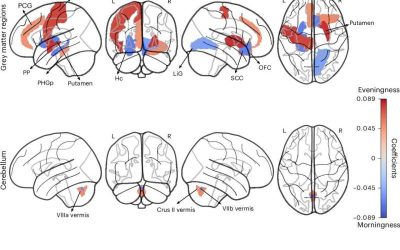Sleep is known to be central to various physiological and mental processes, including the consolidation of memories, supporting various cognitive functions, helping to clear the brain of neurotoxins, balancing hormones and promoting cardiovascular health. Some recent...
Sleep Disorders
New insight into the neurobiological roots of being a ‘morning person’ or ‘night owl’
Human beings exhibit marked differences in habits, lifestyles and behavioral tendencies. One of these differences, known as chronotype, is the inclination to sleep and wake up early or alternatively to sleep and wake up late.
Healthy sleep patterns decrease the risk of being hospitalized for infections, study finds
Sleep is an essential biological process known to contribute to both mental and physical health. In addition to supporting memory processes and learning, boosting concentration, facilitating the body's recovery, and promoting cardiovascular health, good quality sleep...
Study finds that microglia could regulate sleep via the modulation of norepinephrine transmission
Sleep is known to play a key role in facilitating various physiological processes, while also contributing to the healthy functioning of the brain. Lack of sleep and poor sleep quality have been linked to various chronic health and mental health issues, including high...
Study highlights the key role of the prefrontal cortex in regulating REM sleep
Rapid eye movement (REM) sleep is the stage of the sleep cycle during which vivid dreaming typically takes place. This crucial sleep phase, characterized by relaxed muscles, rapid eye movements, an elevated heart rate and irregular breathing patterns, has been linked...
Activating astrocytes in the basal forebrain keeps mice awake without any signs of sleepiness
Sleep is known to support the proper functioning of body, including the brain, allowing it to rest, recover, and recharge. While countless neuroscientists and medical researchers have been trying to better understand this vital biological process, much of its neural...






